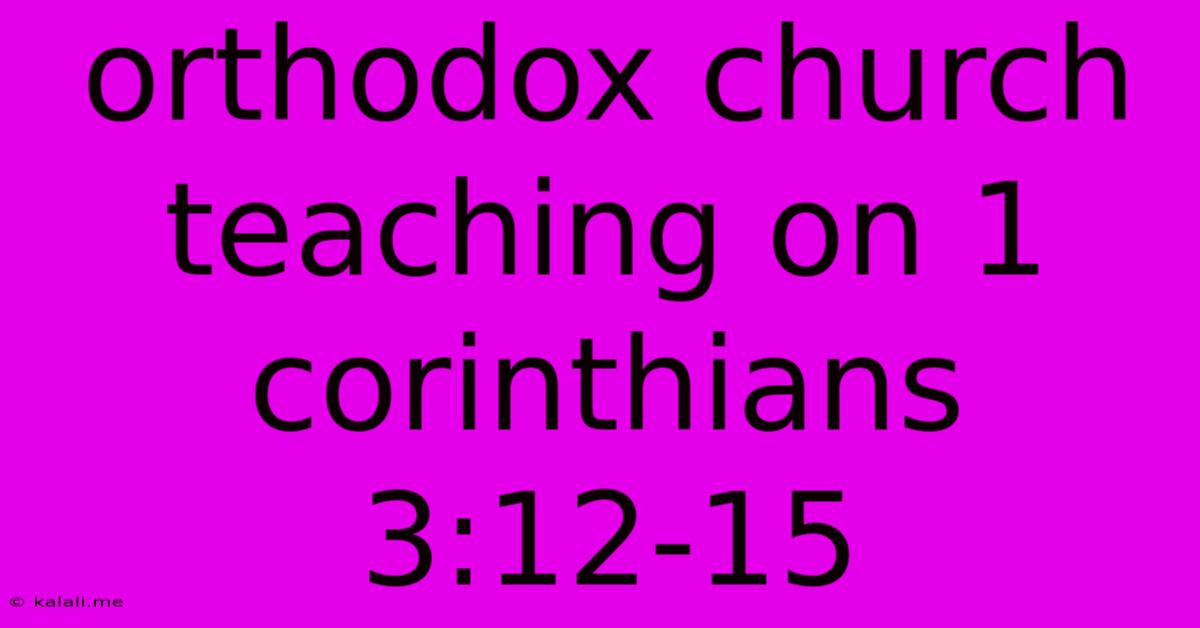Orthodox Church Teaching On 1 Corinthians 3:12-15
Kalali
May 31, 2025 · 4 min read

Table of Contents
Orthodox Church Teaching on 1 Corinthians 3:12-15: Building on the Foundation of Christ
1 Corinthians 3:12-15 is a challenging passage often cited in discussions about salvation, judgment, and the nature of Christian life. This passage, focusing on the imagery of building with various materials, offers profound insights into the spiritual life within the Orthodox Christian tradition. Understanding its context and the Orthodox interpretation is crucial for appreciating its enduring relevance.
The Passage: Let's begin by looking at the passage itself:
"Now if anyone builds on this foundation with gold, silver, precious stones, wood, hay, straw— each one’s work will become manifest, for the Day will disclose it, because it will be revealed with fire, and the fire will test what sort of work each one has done. If what he has built on the foundation survives, he will receive a reward. If his work is burned up, he will suffer loss, though he himself will be saved, but only as through fire." (1 Corinthians 3:12-15, ESV)
The Orthodox Understanding: Foundation, Materials, and Fire
The Orthodox Church interprets this passage not as a literal description of individual salvation being dependent on specific actions, but rather as a metaphor for the development of spiritual character and the ultimate judgment of works.
-
The Foundation (Christ): The "foundation" undeniably refers to Jesus Christ. All Christian life, all spiritual building, rests on this unshakeable bedrock of faith in Christ's person and work. No amount of personal effort can substitute for this fundamental cornerstone.
-
The Building Materials: The various materials represent the quality of our spiritual work – the choices we make, the lives we live, and the actions we perform. "Gold, silver, and precious stones" symbolize virtuous acts performed out of love, faith, and a genuine desire to serve God. These are actions rooted in genuine repentance and spiritual growth. Conversely, "wood, hay, and straw" represent actions motivated by self-interest, pride, or a lack of genuine faith. These are often outwardly religious actions that lack inner transformation. This is not about specific "works" earning salvation, but the quality and motivation behind them.
-
The Fire of Judgment: The "fire" isn't a literal fiery inferno, but rather a metaphor for the transformative power of God's love and judgment. It represents the refining process through which our actions, motivations, and even our very selves are tested and purified. This process occurs both in this life, through trials and tribulations, and ultimately in the eschatological judgment.
-
Salvation and Loss: The crucial point, often missed, is the phrase "though he himself will be saved, but only as through fire." This emphasizes that while ultimate salvation is secured through faith in Christ (the foundation), the quality of our spiritual work directly impacts our experience of that salvation. The fire purifies the genuine faith from the impurities of self-centered actions. The "loss" refers not to the loss of salvation, but the loss of rewards – the inability to fully participate in the Kingdom of God to the extent we might have otherwise. It is a loss of heavenly treasures, not of eternal life itself.
Implications for the Orthodox Christian Life:
This passage underscores several key aspects of Orthodox Christian teaching:
- Theosis: The Orthodox Church emphasizes theosis, the process of becoming like God through participation in God's life. This passage reflects that process, showcasing the continuous transformation of our lives through our actions and choices.
- The Importance of Virtue: The focus on quality over quantity underscores the critical role of virtuous living, driven by love for God and neighbor, not merely outward conformity to religious practices.
- Repentance and Confession: Recognizing that our actions often fall short of God's standard highlights the importance of regular repentance and confession, seeking God's forgiveness and His grace to transform our lives.
- Humility: The potential for "loss" in this passage teaches humility. It reminds us that our salvation is entirely a gift from God, not something we earn through our works.
In conclusion, 1 Corinthians 3:12-15, understood through the lens of Orthodox Christianity, is not a formula for earning salvation but a powerful metaphor for the journey of spiritual growth, emphasizing the importance of building our lives on the unshakeable foundation of Christ, striving for virtuous actions rooted in love, and humbly accepting God's refining fire. It is a call to continually examine our motivations and to live lives worthy of the grace we have received.
Latest Posts
Latest Posts
-
How Do You Say Bug In Spanish
Jun 01, 2025
-
How Do You Say Hot Chocolate In Spanish
Jun 01, 2025
-
How Do I Test Continuity With A Multimeter
Jun 01, 2025
-
Toilet Not Flushing After Heavy Rain
Jun 01, 2025
-
Non Dimmable Led Bulb On Dimmer
Jun 01, 2025
Related Post
Thank you for visiting our website which covers about Orthodox Church Teaching On 1 Corinthians 3:12-15 . We hope the information provided has been useful to you. Feel free to contact us if you have any questions or need further assistance. See you next time and don't miss to bookmark.